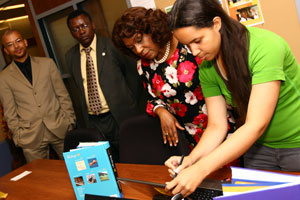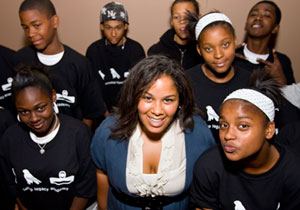 |
| Chemistry student Leanne Lucas demonstrates the tablet device that will allow tutors and high school students to interact online to Lieutenant Governor Mayann E. Francis. (Bruce Bottomley Photo) |
Try as he might, physicist Kevin Hewitt can’t use the physics analogy he counted on to explain the Imhotep’s Legacy Academy, a project that’s been close to his heart since he founded it at ±«Óătv in 2003.
Imhotep’s Legacy Academy turns out to be the exception to the rule of “quantum fluctuations,” those energetic particles that appear out of nothing. Rather, the energy of the program definitely came from something—that something being the passion of its founders to promote the educational, social and personal development of young African Nova Scotian learners in math and science.
Arriving at ±«Óătv in 2001, Dr. Hewitt’s connections with Wayn Hamilton, then working with the African Canadian Services Division, and Barb Hamilton-Hinch, Black Student Advisor at ±«Óătv, helped transform the program from idea to reality. “This wasn’t anything that came out of a vacuum,” says Dr. Hewitt, associate professor with the Department of Physics and Atmospheric Science. “None of us could have accomplished anything without the other.”
|
“I only wish Imhotep was around when I was in school, oh I guess that was 10 years ago,” said Ms. Francis to much laughter at the celebration yesterday.
The virtual school program allows the academy, until now focused on junior-high students, to reach out to high school students in Yarmouth, Sydney, Dartmouth, Cole Harbour, Halifax and Truro. It will serve as an online meeting space for the students, many of whom will have gone through Imhotep’s after-school program, and ±«Óătv University tutors in math, biology, chemistry and physics. Tablet PCs, equipped with touch screens and styluses, will allow the students and tutors to solve problems together, explains program manager Emmanuel Nfonoyim. He’s looking to hire 10 tutors for the program.
As he mentions, the virtual school program builds on Imhotep’s long-standing after-school program, which places mentors—±«Óătv University students of African descent—in junior high schools to work with students in Grades 7 to 9. The mentors are in turn mentored by professors who provide training and support. (Joining Dr. Hewitt in that role are Sophia Stone, assistant professor of biology; Pemberton Cyrus, associate dean of undergraduate studies in the Faculty of Engineering; Wilbur Menendez Sanchez, a chemist at NSCC; and Tobias Karakach, research associate at NRC Atlantic.)
 |
| Mentor Ashley Fairfax (centre) is surrounded by participants in Imhotep's after-school program. Back row, Dakeyo Downey, Phoenix Skinner-Peach, Deneell Desmond, Glendeira Smith, Kyle Williams; front Trina Williams, and Menderian Smith. (Bruce Bottomley Photo) |
While organizers fully expected young people to benefit by Imhotep, they didn’t anticipate the rich payback for the mentors, says Barb Hamilton-Hinch, now a professor in the Department of Health and Human Performance. Many of the university students have gone on to do graduate degrees or been accepted into professional programs including Dentistry and Medicine.
The experience teaching teenagers has been invaluable, agrees Ashley Fairfax, a third-year student in mineral resource engineering. You become comfortable speaking in front of groups, she explains, and changing things on the fly when what you planned just isn’t working out. The biggest reward is watching the kids grow and develop over the years, transforming from shy and tentative to outgoing and confident.
“They can be a tough audience—when it’s Friday afternoon and they’re itching to go home,” says Ms. Fairfax, 20. “It is challenging but you become pretty adept at handling whatever they throw at you."
